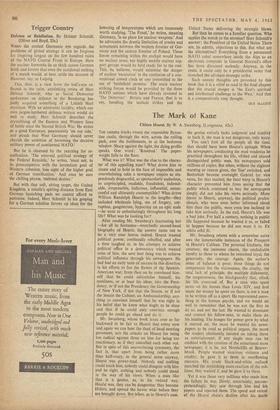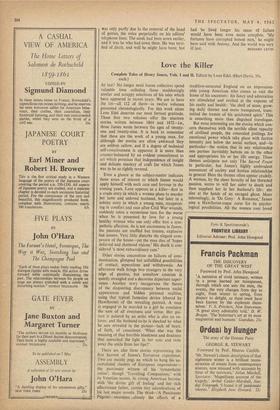The Mark of Kane
Citizen Hearst. By W. A. Swanberg. (Longmans, 42s.) THE camera tracks round the impossible Byzan- tine castle, through the wire, across the rolling park, over the battlements, in at the bedroom window. Sharp against the light, the dying profile speaks. One word: 'Rosebud.' The paper- weight falls to the floor.
What was it? What was the clue to the charac- ter of this appalling man? What drove him to create and to hold in the face of impossible and overwhelming odds a newspaper empire so stu- pendously disgraceful, so spectacularly audacious, so unprincipled, readable, fraudulent, indomit- able, irrepressible, ludicrous, influential, unsuc- cessful and ultimately contemptible? What drove William Randolph Hearst to the lengths—they included wholesale lying, use of forgery, cor- ruption, gangsterism, hypocrisy on an epic scale —he went to unhesitatingly throughout his long life? What was he looking for?
After reading Mr. Swanberg's fascinating but —for all its footnotes—wretchedly second-hand biography of Hearst, the answer turns out to be a very sour lemon indeed. Hearst wanted political power; continually rebuffed, and after a time laughed at, in his attempts to achieve political office in a democracy which wanted none of him, the next best thing was to achieve political influence through his newspapers. He had had an early taste of success in this direction in his efforts to fan the flames of th,e Spanish- American war; from then on he convinced him- self that he could editorialise himself, his nominees, or at least his ideas, into the Presi- dency, or if not the Presidency the Governorship
of New York, if not that the Senate, or if not the Senate the Cabinet, an Ambassadorship, any- thing to convince himself that he was right in his belief that he knew what ought to be done and that if he could only convince enough people he could go ahead and do it.
Mr. Swanberg, whose book leans over so far backward to be fair to Hearst that every now and again we can hear the thud of head meeting pavement, sets the attacks on Hearst for being too radical against those on him for being too reactionary, as if they cancelled each other out.
But in spite of this unconvincing symmetry, the fact is, that apart from being rather more than half-crazy, in the general sense anyway, Hearst was power-mad. Nobody and nothing could teach him, nobody could disagree with him and be right, nothing and nobody could stand in the way of his views. When a man like that is a genius, as, in his twisted way,
Hearst was, they can be dangerous; they become Hitlers, and spread the havoc wide before they are brought down. But when, as in Hearst's case,
the genius entirely lacks judgment and stability to back it, the man is not dangerous, only nasty.
You can't fool all the people all the time; that should have been Hearst's epitaph. When his newspapers, conducting the mad vendettas he practised throughout his life, vilified and abused distinguished public men, his newspapers sold millions of copies. But when, without the slightest warning or reason given, the 'line' switched, and Beelzebub became overnight Gabriel (or vice versa, for that matter), the fatal warp in Hearst's character prevented him from seeing that the public which continued to buy the newspapers simply did not take his views seriously. More (more to Hearst, anyway), the political profes- sionals, who were even better informed about him than the public, were even less inclined to take him seriously. In the end, Hearst's life was a bad joke. For half a century, nothing in public life happened because he wanted it to, or failed to happen because he did not want it to. Ex nihilo nihil fit.
Mr. Swanberg relates with a somewhat naive awe the innumerable instances of the Prospero in Hearst's Caliban. The personal kindness, the courtesy, the immense charm, the unshakable loyalty to those to whom he remained loyal, the generosity, the courage. Again, the author's sense of balance is poor; these things do not compensate for the viciousness, the cruelty, the total lack of principle, the multiple dishonesty, the megalomania, the blackguardry that, sifted, his life consisted of. But a man who spent more on his homes than Louis XIV, and first made the money he spent on them, is not a man to be written off as a sport. He represented some- thing in the human psyche, and we would do well to remember that he was not the first to do so, and not the last. He wanted to dominate and control his fellow-men, to make them do his bidding. The hunger for power grew by what it starved on; the more he wanted his news- papers to be read as political organs, the more the readers obstinately insisted on taking them as entertainment; if any single man can be credited with the creation of the sensational mass newspaper, it is he, not Northcliffe or Beaver- brook. People wanted vicarious violence and crudity; he gave it to them in overflowing measure. His crude black-and-white outlook matched the unthinking mass-reaction of the mil- lions; they wanted it, and he gave it to them.
Yet it was those very millions who made him the failure he was. Dimly, uncertainly, uncom- prehendingly, they saw through him and his papers and rejected them. The speed and extent of the Hearst chain's decline after his death
was only partly due fo the removal of the hand of genius, the voice perpetually on his editors' telephone lines. The seeds had been sown earlier, and it was he who had sown them. He was terri- fied of death, and well he might have been; but had he lived longer his sense of failure would have been even more complete. 'My fortunes have corrupted honest men,' he might have said with Antony. And the world was very







































 Previous page
Previous page